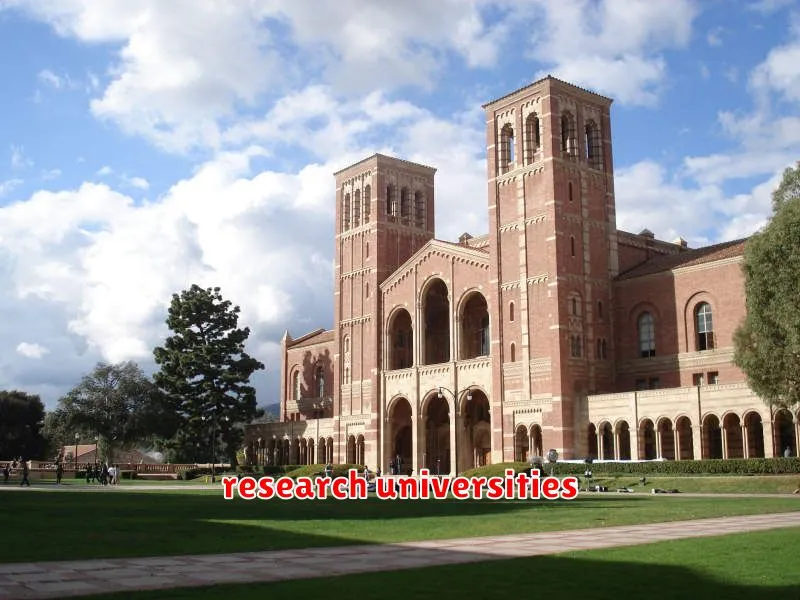Are you passionate about pushing the boundaries of knowledge and contributing to groundbreaking discoveries? If so, then pursuing your education at one of the world’s top research universities should be a priority. This article will delve into the top 10 international universities that consistently excel in research, providing a fertile ground for innovative ideas and impactful advancements. From renowned faculty to state-of-the-art facilities, these institutions attract brilliant minds from across the globe, fostering a dynamic and intellectually stimulating environment. Join us as we explore these prestigious universities and uncover the secrets behind their exceptional research excellence.
Massachusetts Institute of Technology

The Massachusetts Institute of Technology (MIT) is a private research university in Cambridge, Massachusetts. Founded in 1861 in response to the increasing industrialization of the United States, MIT has since become one of the world’s leading research universities. It is consistently ranked among the top universities globally for its academic reputation, research output, and impact on society.
MIT is known for its strong emphasis on science, engineering, and technology, with a particular focus on interdisciplinary research. It offers a wide range of undergraduate and graduate programs across various disciplines, including:
- Engineering: Aerospace, Biological, Chemical, Civil, Electrical, Mechanical, Nuclear, etc.
- Science: Biology, Chemistry, Physics, Earth Sciences, Mathematics, Computer Science, etc.
- Humanities, Arts, and Social Sciences: Architecture, Economics, History, Literature, Linguistics, Philosophy, Political Science, etc.
- Management: Business, Finance, Operations, Marketing, etc.
MIT is home to a renowned faculty, including Nobel laureates, Turing Award winners, and MacArthur Fellows. The university boasts cutting-edge research facilities, such as the MIT Media Lab, the Computer Science and Artificial Intelligence Laboratory (CSAIL), and the Koch Institute for Integrative Cancer Research.
MIT has played a significant role in technological advancements, contributing to breakthroughs in fields like artificial intelligence, robotics, biotechnology, and materials science. Its graduates have gone on to become leaders in industry, academia, and government, making a lasting impact on the world.
MIT’s campus is located on a sprawling 168-acre site in Cambridge, adjacent to the Charles River. The campus is known for its distinctive modern architecture, featuring iconic structures like the Great Dome, the Kresge Auditorium, and the Stata Center.
MIT is a highly selective institution, admitting only a small percentage of applicants each year. The university’s rigorous academic standards and demanding curriculum attract students from all over the world who are eager to pursue a challenging and rewarding education.
Stanford University
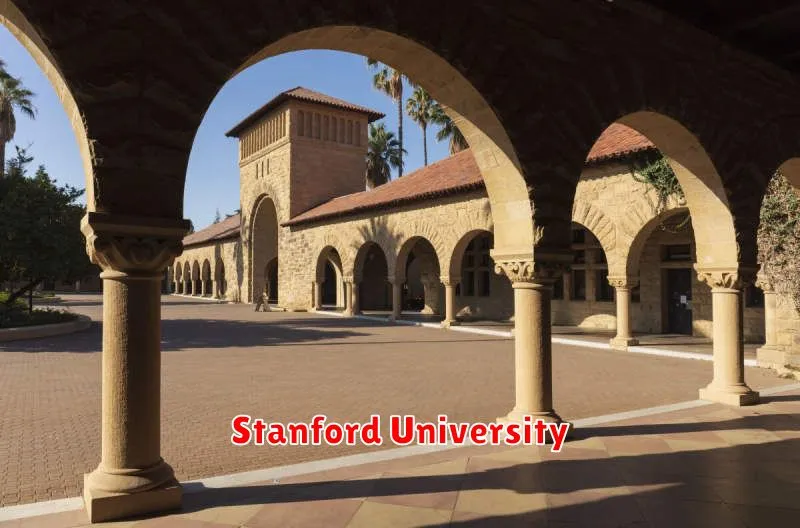
Stanford University is a private research university located in Stanford, California. Founded in 1885 by Leland Stanford and his wife, Jane, the university is known for its academic excellence, its beautiful campus, and its proximity to Silicon Valley. Stanford is consistently ranked among the top universities in the world, and it is home to many notable alumni, including 30 Nobel laureates, 29 Turing Award winners, and eight astronauts. The university is also a major research institution, with a focus on science, technology, engineering, and medicine.
Stanford’s main campus is located on a 8,180-acre (3,310 ha) site in the heart of Silicon Valley, just south of San Francisco. The campus is known for its beautiful architecture, including the iconic Hoover Tower and the Stanford Memorial Church. The university is also home to a number of museums, including the Cantor Arts Center, the Stanford Museum of Art, and the Anderson Collection at Stanford University. The university’s athletic teams, known as the Stanford Cardinal, are also very successful, competing in the NCAA Division I Pac-12 Conference.
Stanford University offers a wide range of undergraduate and graduate programs. The university has 16 schools, including the Stanford School of Medicine, the Stanford Graduate School of Business, and the Stanford School of Law. Stanford is also home to a number of research institutes, including the Stanford Institute for Human-Centered Artificial Intelligence (HAI) and the Stanford Woods Institute for the Environment.
Stanford University is a world-renowned institution that has played a significant role in shaping the course of human history. The university’s commitment to academic excellence, research, and innovation has made it one of the most influential universities in the world.
University of Cambridge
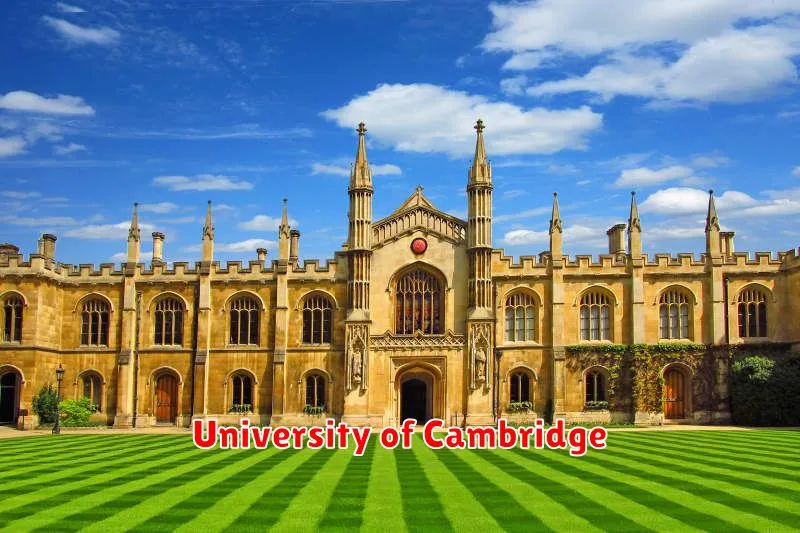
The University of Cambridge is a collegiate public research university in Cambridge, England. Founded in 1209, Cambridge is the second-oldest university in the English-speaking world and the world’s fourth-oldest surviving university. It has been ranked among the top 5 universities globally in numerous rankings. The university is comprised of 31 constituent colleges and over 100 academic departments organised into faculties.
Cambridge is known for its strong academic reputation, its beautiful campus, and its rich history. Some of the most famous alumni of Cambridge include Sir Isaac Newton, Charles Darwin, and Stephen Hawking.
Academics
Cambridge offers a wide range of undergraduate and postgraduate degrees in subjects such as the arts, humanities, sciences, and social sciences. The university is renowned for its research excellence, and its academics have made significant contributions to many fields.
Colleges
Each college at Cambridge is a self-governing institution with its own unique character and traditions. Students live, study, and socialize within their colleges. While the colleges are independent, they are all part of the University of Cambridge, and students have access to the university’s facilities and resources.
Campus
The University of Cambridge campus is spread throughout the city of Cambridge. The main campus is located in the city center, and the colleges are scattered throughout the city. Cambridge is a beautiful city with a rich history, and the university is an integral part of the city’s culture.
Admissions
Admissions to Cambridge are highly competitive. The university is one of the most selective universities in the world. Applicants must have excellent academic qualifications and must be able to demonstrate their potential for success in their chosen field of study.
Harvard University

Harvard University is a private Ivy League research university in Cambridge, Massachusetts. Founded in 1636, it is the oldest institution of higher learning in the United States and one of the most prestigious universities in the world.
Harvard is a large university with a diverse student body and a wide range of academic programs. It offers undergraduate, graduate, and professional degrees in a variety of fields, including the arts, sciences, humanities, social sciences, engineering, medicine, law, business, and divinity.
The university is known for its world-class faculty, its extensive research facilities, and its commitment to academic excellence. It has produced numerous Nobel laureates, Pulitzer Prize winners, and other distinguished alumni.
Academics
Harvard is organized into 12 schools, each with its own distinct academic focus:
- Harvard College (undergraduate)
- Harvard Graduate School of Arts and Sciences
- Harvard Law School
- Harvard Medical School
- Harvard School of Dental Medicine
- Harvard School of Public Health
- Harvard Divinity School
- Harvard Business School
- Harvard John F. Kennedy School of Government
- Harvard Graduate School of Education
- Harvard School of Design
- Harvard Extension School
Harvard offers a wide variety of undergraduate and graduate programs, including:
- Arts and humanities: English, history, philosophy, art history, music, theater
- Sciences: biology, chemistry, physics, mathematics, computer science
- Social sciences: economics, psychology, sociology, political science
- Engineering: computer engineering, electrical engineering, mechanical engineering
- Medicine: medicine, dentistry, public health
- Law: law
- Business: business administration, management
- Divinity: theology, religious studies
Campus
Harvard’s main campus is located in Cambridge, Massachusetts, across the Charles River from Boston. The campus is home to a variety of historic buildings, including Harvard Yard, the Widener Library, and the Memorial Church.
The university also has campuses in Allston, Massachusetts, and in several other locations around the world. The Harvard campus is a vibrant and diverse community with a strong sense of tradition and history.
Admissions
Harvard is one of the most selective universities in the world. The admission process is highly competitive, and applicants are typically required to have outstanding academic records, strong standardized test scores, and a demonstrated commitment to extracurricular activities.
Harvard’s admissions committee seeks to admit students who are academically gifted, intellectually curious, and who will contribute positively to the university community.
Financial Aid
Harvard offers a generous financial aid program to students who demonstrate need. The university meets the full demonstrated financial need of all admitted students, without loans.
Harvard also offers a variety of scholarships and grants to students based on academic merit, leadership potential, and other factors.
Legacy
Harvard has a rich history and a long legacy of academic excellence. It has played a major role in shaping American higher education and has made significant contributions to the world in the fields of science, technology, the arts, and humanities.
Harvard is a university that continues to inspire and challenge its students and faculty to make a difference in the world.
University of Oxford
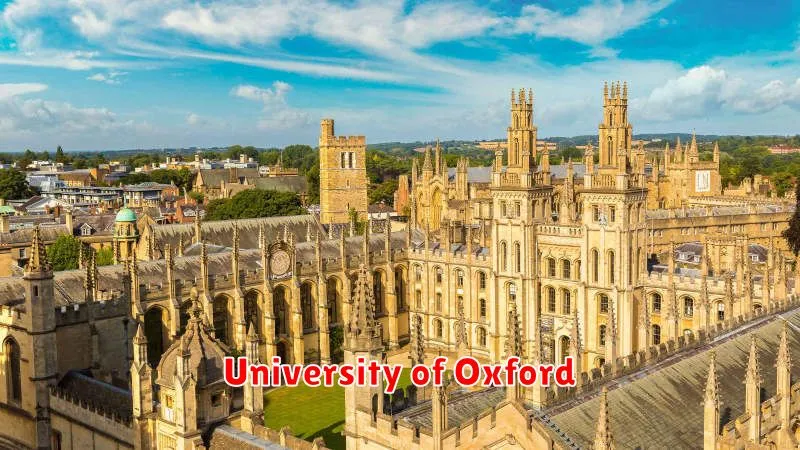
The University of Oxford is a collegiate research university in Oxford, England. It is the oldest university in the English-speaking world and the world’s second-oldest university in continuous operation. It is consistently ranked among the top universities in the world. The University of Oxford is home to a diverse range of academic disciplines, including science, humanities, social sciences, and medicine. The university is known for its excellent teaching and research, and its graduates have gone on to achieve success in a variety of fields.
The University of Oxford is comprised of 39 constituent colleges and six permanent private halls, all of which are self-governing institutions. The university’s central administration is responsible for coordinating the activities of the colleges and halls, as well as for managing the university’s finances and resources.
The University of Oxford offers a wide range of undergraduate and postgraduate degrees. The university’s undergraduate programs are highly competitive, and only the most academically gifted students are admitted. Postgraduate programs at Oxford are equally selective, and students are required to have a strong academic background in their chosen field of study.
The University of Oxford is a vibrant and exciting place to study. The university’s colleges and halls provide students with a sense of community, and the university’s libraries and museums offer students access to some of the world’s most important resources. The university also has a strong commitment to student life, with a wide range of clubs, societies, and sports teams to choose from. Students at Oxford are encouraged to take advantage of the many opportunities available to them, both within the university and beyond.
University of California, Berkeley
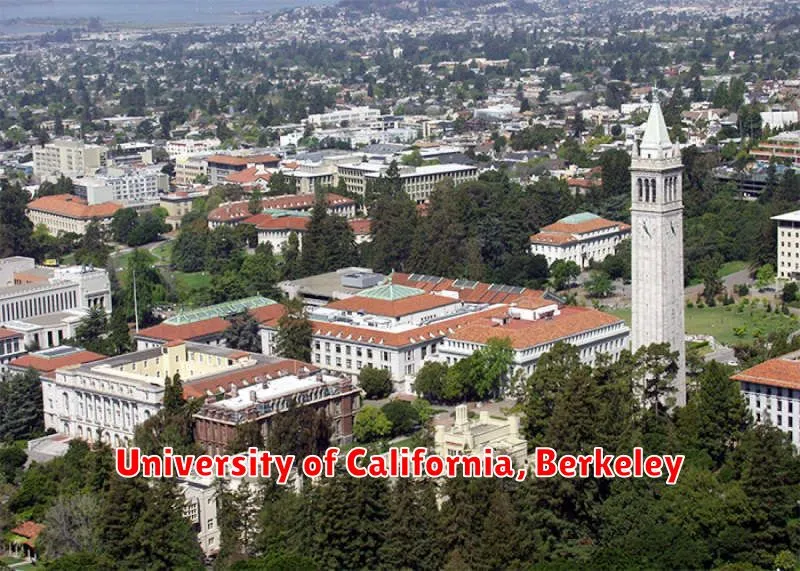
The University of California, Berkeley, often referred to as Berkeley or Cal, is a public research university located in Berkeley, California. Founded in 1868, it is the flagship institution of the University of California system and is widely regarded as one of the world’s leading universities.
Berkeley is renowned for its academic excellence, research facilities, and diverse student body. It offers a wide range of undergraduate and graduate programs in various disciplines, including the humanities, social sciences, sciences, engineering, law, and medicine. The university has a long history of innovation and groundbreaking discoveries, and its faculty members have won numerous Nobel Prizes and other prestigious awards.
Campus Life
The Berkeley campus is a vibrant and bustling hub of intellectual and cultural activity. With its iconic Campanile bell tower, sprawling green spaces, and historic buildings, the campus offers a picturesque and stimulating environment for learning and exploration. Students can participate in a wide array of extracurricular activities, from sports and clubs to arts and music events.
Research and Innovation
Berkeley is a leading center for research and innovation, with a strong emphasis on interdisciplinary collaboration. Its researchers are at the forefront of groundbreaking discoveries in fields such as medicine, technology, environmental science, and social justice. The university has numerous research centers and institutes, including the Lawrence Berkeley National Laboratory and the California Institute for Quantitative Biosciences.
Impact and Influence
Berkeley has a significant impact on society through its research, education, and outreach programs. Its graduates have made significant contributions to various fields, including science, technology, business, politics, and the arts. The university also plays a vital role in the local community, through its engagement in community service, public education, and cultural enrichment initiatives.
California Institute of Technology
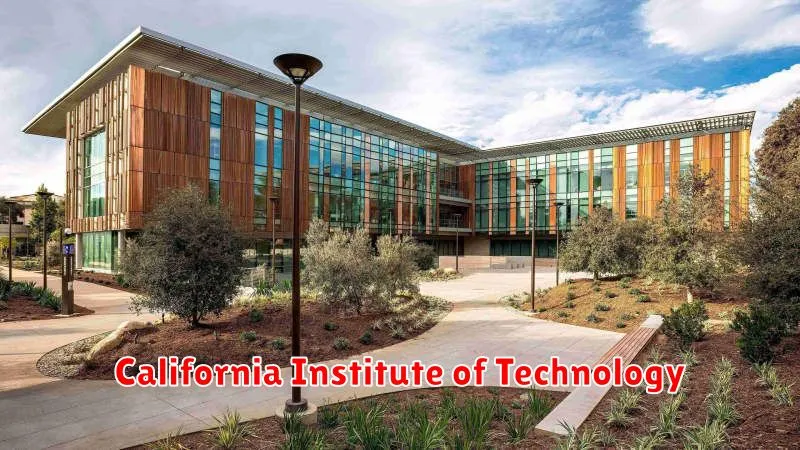
The California Institute of Technology (Caltech) is a private research university located in Pasadena, California. Founded in 1891 as a preparatory school, Caltech quickly transitioned into a world-renowned institution for science and engineering. It is known for its exceptional academic programs, groundbreaking research, and Nobel laureate faculty.
Academics
Caltech offers undergraduate and graduate degrees in a wide range of scientific and engineering disciplines. Some of its most notable academic programs include:
- Physics
- Chemistry
- Biology
- Engineering
- Mathematics
- Astronomy
- Geophysics
- Computer Science
Caltech’s faculty boasts a remarkable number of Nobel laureates and other prestigious award recipients, providing students with access to leading experts in their fields. The small class sizes and emphasis on hands-on learning foster an environment of intellectual curiosity and collaboration.
Research
Caltech is renowned for its world-class research, particularly in areas such as:
- Astrophysics
- Nanotechnology
- Quantum computing
- Climate science
- Biotechnology
The university boasts state-of-the-art research facilities, including the Jet Propulsion Laboratory (JPL), which is responsible for designing, developing, and operating robotic spacecraft for NASA.
Campus Life
Caltech’s campus is a vibrant and intellectually stimulating environment. The university offers a wide range of student organizations, clubs, and activities. Students have access to exceptional athletic facilities, including a swimming pool, tennis courts, and a fitness center. The campus also features a beautiful botanical garden and a renowned art museum.
Located in the heart of Pasadena, Caltech is a short distance from the city’s attractions, including the Rose Bowl, the Huntington Library, Art Collections and Botanical Gardens, and the Norton Simon Museum.
Notable Alumni
Caltech alumni have made significant contributions to science, engineering, and society. Some of the university’s most notable alumni include:
- Richard Feynman (Nobel Prize in Physics)
- Linus Pauling (Nobel Prize in Chemistry and Nobel Peace Prize)
- David Baltimore (Nobel Prize in Medicine)
- Kip Thorne (Nobel Prize in Physics)
- Robert Millikan (Nobel Prize in Physics)
National University of Singapore

The National University of Singapore (NUS) is a public research university located in Singapore. It was established in 1905 as the Straits Settlements and Federated Malay States Government Medical School and has since grown into a comprehensive university with 17 faculties and schools, offering a wide range of undergraduate and postgraduate programs across various disciplines.
NUS is consistently ranked among the top universities in the world, consistently placing within the top 20 in various global university rankings. Its reputation for academic excellence, world-class research facilities, and diverse student body has attracted students and faculty from around the globe.
The university is renowned for its research strengths in areas such as medicine, engineering, science, and social sciences. It has played a pivotal role in Singapore’s economic development and continues to contribute significantly to the country’s technological advancements and scientific breakthroughs.
NUS also fosters a vibrant and inclusive campus culture, offering students numerous opportunities for extracurricular activities, leadership development, and community engagement. The university boasts a sprawling campus with state-of-the-art facilities, lush green spaces, and a thriving arts and culture scene.
In conclusion, the National University of Singapore is a world-renowned institution of higher learning that offers a transformative educational experience. Its commitment to academic excellence, research innovation, and student development has made it a leading university in Asia and a global beacon of knowledge.
ETH Zurich

The Swiss Federal Institute of Technology in Zurich, commonly known as ETH Zurich, is a public research university in Zurich, Switzerland. Founded in 1855, it is one of the world’s leading universities in science, technology, engineering, and mathematics (STEM). ETH Zurich is consistently ranked among the top universities globally, known for its high academic standards, innovative research, and entrepreneurial spirit.
History and Legacy
ETH Zurich traces its roots back to the Federal Polytechnic School, established in 1855. The institution was initially focused on engineering and technical education, but it gradually expanded its scope to encompass a wider range of disciplines. Throughout its history, ETH Zurich has played a pivotal role in shaping the scientific and technological landscape of Switzerland and the world.
Academics and Research
ETH Zurich offers a comprehensive range of undergraduate and graduate programs across various disciplines, including:
- Engineering: Civil, Mechanical, Electrical, Chemical, Computer Science, and more
- Science: Mathematics, Physics, Chemistry, Biology, and more
- Architecture: Architecture, Urban Planning, and Landscape Architecture
- Management: Business Administration, Economics, and Finance
The university is renowned for its cutting-edge research, particularly in areas such as:
- Artificial Intelligence: Machine Learning, Robotics, and Computer Vision
- Sustainability: Renewable Energy, Climate Change, and Environmental Engineering
- Materials Science: Nanotechnology, Biomaterials, and Advanced Materials
- Medicine: Bioengineering, Biotechnology, and Medical Devices
Notable Alumni
ETH Zurich has produced a remarkable number of notable alumni, including:
- Albert Einstein: Physicist, Nobel laureate
- Werner Heisenberg: Physicist, Nobel laureate
- Richard Ernst: Chemist, Nobel laureate
- Charles Kuen Kao: Physicist, Nobel laureate
- Rolf M. Zinkernagel: Immunologist, Nobel laureate
Campus and Location
ETH Zurich is located in the heart of Zurich, a vibrant city known for its beautiful architecture, high quality of life, and rich cultural heritage. The university’s main campus is a modern and spacious complex, boasting state-of-the-art facilities, including research laboratories, libraries, and student housing. The campus is conveniently situated near the city center, providing easy access to public transportation and various amenities.
ETH Zurich is a leading institution of higher education, renowned for its academic excellence, cutting-edge research, and entrepreneurial spirit. It continues to attract top students and faculty from around the world, making significant contributions to science, technology, and innovation. With a rich history and a bright future, ETH Zurich remains a beacon of knowledge and progress, shaping the world for generations to come.
University of Tokyo
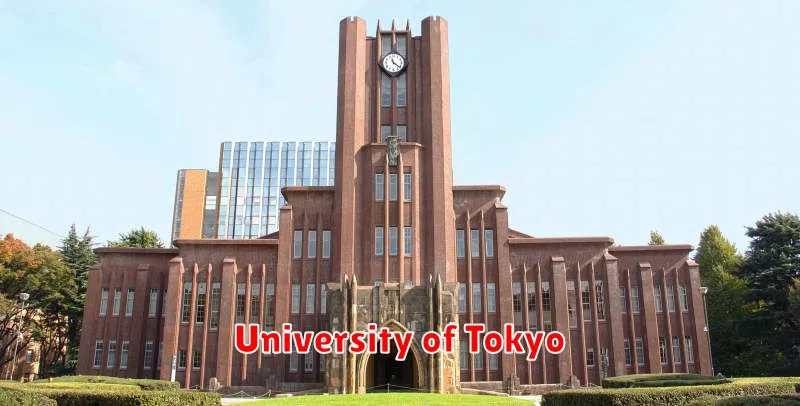
The University of Tokyo, also known as Todai, is a public research university located in Bunkyo, Tokyo, Japan. It is consistently ranked among the top universities in the world and is renowned for its academic excellence, research, and prestigious alumni.
History
Founded in 1877, the University of Tokyo has a rich history dating back to the Meiji Restoration. It was originally established as the Tokyo Imperial University and later became the University of Tokyo in 1949. Over the years, it has played a significant role in the development of Japan’s modern society and has produced numerous Nobel laureates, Fields Medalists, and other distinguished scholars.
Academics
The University of Tokyo offers a wide range of undergraduate and graduate programs across various disciplines, including humanities, social sciences, law, economics, medicine, engineering, and science. It is home to 10 faculties, 15 graduate schools, and several research institutes. Its academic programs are highly competitive, with rigorous admission standards and a focus on research and innovation.
Campus Life
The University of Tokyo’s main campus is located in the Hongo district of Bunkyo, Tokyo. The campus is known for its beautiful architecture, lush green spaces, and vibrant atmosphere. Students have access to excellent libraries, research facilities, and a variety of extracurricular activities, including sports, clubs, and societies.
Research
The University of Tokyo is a leading research institution in Japan and around the world. Its faculty and students are actively engaged in cutting-edge research across a broad range of fields, including physics, chemistry, biology, medicine, engineering, and social sciences. It has been involved in numerous groundbreaking discoveries and technological advancements.
Alumni
The University of Tokyo boasts a distinguished alumni network, including Nobel laureates, Fields Medalists, politicians, business leaders, and cultural figures. Some notable alumni include:
- Hideki Yukawa, Nobel laureate in Physics
- Shinichiro Tomonaga, Nobel laureate in Physics
- Kenichi Fukui, Nobel laureate in Chemistry
- Taro Aso, former Prime Minister of Japan
- Hiroshi Mikitani, founder and CEO of Rakuten
The University of Tokyo is a prestigious institution of higher learning that has played a pivotal role in Japan’s academic and societal development. Its commitment to excellence, research, and innovation has earned it a reputation as one of the top universities in the world. It continues to attract talented students and faculty from around the globe and remains a source of groundbreaking discoveries and transformative ideas.

